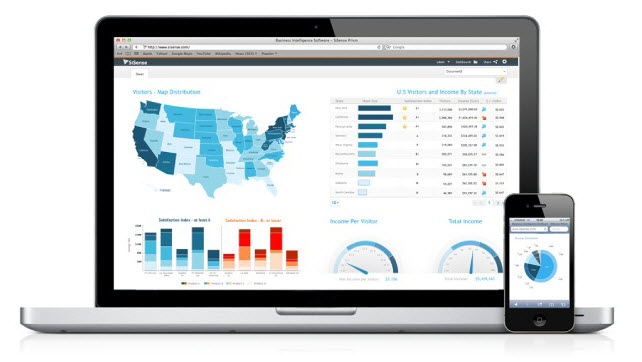Dashboard software and services: a business buyer's guide
How to use a dashboards to manage your business

In larger businesses the dashboard has become an essential business tool. Being able to show at a glance the key information that all business owners need to track has made these applications very popular. However with the advent of cloud technologies more and more dashboards applications are becoming available to the small and medium sized business.
The information you can expect to track via a dashboard can include the performance of your website. The cash flow through your business. The key performance indicators (KPIs) that you have defined for your company such as the movement of stock in and out of your business. The level of sales your business is making or perhaps the performance of specific marketing channels. Anything that you think is important can be measured and included on a dashboard.
Developing a dashboard approach to the management of your business has a number of advantages including:
- You can instantly see a snapshot of how well or not, your business is going.
- Specific KPIs such as profitability or breakeven point can be watched in detail.
- Problems can be spotted within your business early enough for you to take action.
- A dashboard can help you make sense and analyse masses of data such as that generated by your business' social media networks.
- Future business planning relies on understanding what has happened in the past. A dashboard can give your business that legacy information.
- 'What if' scenarios can be tested using a dashboard to help you efficiently manage the development of your business into the future.
As no two businesses are alike, so your business' dashboard will be unique. Juice Analytics, in their guide to business dashboards, said: "Dashboards can come in many flavours. What never changes is good dashboards focus on the most important information and communicates this information clearly and concisely. The delivery channel, level of interactivity, timeliness of data, and analytical capabilities will vary based on the situation."
When you are developing a dashboard for your business, think about these key components:
- Are you creating a dashboard or a report? A report will look at a specific part of your business, whereas a dashboard offers on-going insights as your company changes on a day-to-day basis.
- Have you developed all the KPIs you will need to populate your dashboard? A dashboard should answer specific questions, but you need to know what these are and create a KPI that can be used in your dashboard.
- What kind of information do you want your dashboard to display? You could view your business' data as charts, graphs, maps, website links or news feeds. What format would make it easier for you to understand the data being displayed on the dashboard?
- Can you change how the data you are seeing on your dashboard is presented? Sometimes certain types of data are best viewed as a chart or graph.
- Is the dashboard's user interface easy to understand? Your dashboard shouldn't be a drain on your time. It's supposed to help you run your business more efficiently.
- How secure is the dashboard you want to use? Many of the dashboard services are cloud based. Look closely at the security of these services. Remember, you are trusting them with highly sensitive information about your business.
Taking your time to think about what you want a dashboard to do for your business is time well spent, as you will be able to find the perfect dashboard platform to help you manage your business.
Dashboard tools
There are a number of dashboard tools to choose form. Some of the leading platforms include:
Sign up to the TechRadar Pro newsletter to get all the top news, opinion, features and guidance your business needs to succeed!
Understanding social data
Today another key aspect of running your business is how it uses social media networks. Because of the torrent of information that social networks can generate, a dashboard can be highly useful to give you insight into how social media is impacting on your business and market.
You can also use a dashboard that is focused on your business' social media activity to track the sentiment being directed at your company. The positive and negative comments about your business can be seen in real time via a dashboard to give you an insight into how your business, its brand, goods and services are being talked about across the social media channels.
There are a number of dashboard applications and services that can help your business make sense of the masses of information that flow into your enterprise on a daily basis from the social space:
Using a dashboard approach to monitoring and analysing the social media networks your business has a presence on can give you the insight you need to make social media work harder for your business. The phenomenon of data overload is a real and present danger with the arrival of social media. A dashboard can help you find the nuggets of information your business needs to ensure it remains a key business across the social media networks.